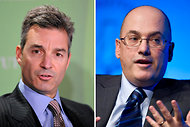But Mr. Obama’s top advisers were not budging. There would be no deal on the federal budget deficit, they told chamber executives, without higher taxes, participants said. If there were doubts about the White House’s resolve, Mr. Obama met the chamber’s chief executive afterward for an unscheduled Oval Office chat about the showdown.
For the United States Chamber of Commerce, long the leading business voice in Washington, this month’s negotiations over the nation’s debt will be a key test of whether it can retain its influence and swagger in the capital even after a string of bruising political losses.
Many business leaders are looking to the chamber as a bulwark against the White House’s push for higher taxes, but it is unclear if the century-old association has the clout it once did. Other business groups seen as more open to tax increases have become players in the negotiations, exposing rifts in the private sector.
The Chamber of Commerce, in the biggest voter mobilization effort in its history, spent tens of millions of dollars in support of pro-business candidates, usually Republicans, in the Nov. 6 elections. But the results were disastrous: out of 48 House and Senate candidates that it spent money to try to either elect or defeat, the outcome went the chamber’s way only seven times, according to data from the Center for Responsive Politics, a Washington research group that tracks political spending.
If the chamber was an 800-pound gorilla before the elections, “now they’re a wounded 500-pound gorilla,” said Cyrus Mehri, a Washington lawyer for U.S. Chamber Watch, a union-backed group that is critical of the chamber’s political practices.
“But they’re still a major force to be reckoned with,” he added.
As the White House looks to work out a deal with Congress to avert hundreds of billions of dollars in automatic budget cuts at the end of the year, Mr. Obama and his top economic advisers have been meeting through the week with business leaders to push their plan for raising taxes on the wealthiest Americans.
Mr. Obama met Wednesday with chief executives from Goldman Sachs, Coca-Cola, Yahoo and other prominent firms, and he met a day earlier with small-business representatives.
The president’s advisers also met with officials from the Campaign to Fix the Debt, a centrist group that has become influential in pushing for a combination of tax increases and spending cuts. It is led by Erskine B. Bowles, a former Clinton administration official, and Alan K. Simpson, a former Republican senator from Wyoming.
When Mr. Obama met two weeks ago with a dozen corporate leaders but did not invite the Chamber of Commerce, it was widely seen as a snub of the group over its political attacks during the presidential campaign. But the chamber got its turn Monday.
Jack Lew, the White House chief of staff, and other senior economic advisers listened as chamber executives, including Thomas J. Donohue, the group’s president, and Bruce Josten, its top lobbyist, laid out their ideas for raising significant revenue without necessarily raising taxes by expanding energy development.
“They wrote it down, but where that goes, I don’t know,” Mr. Josten said in an interview.
But Mr. Josten said that the White House advisers stressed that any debt deal would have to include increased taxes at the highest brackets and that if an agreement could not be reached, they were willing to risk the automatic spending cuts — the so-called fiscal cliff option — at the end of the year.
“They reiterated that they want the higher rates, and they’ll go over the cliff if they need to,” Mr. Josten said.
Article source: http://www.nytimes.com/2012/11/30/business/chamber-competes-to-be-heard-in-fiscal-debate.html?partner=rss&emc=rss
